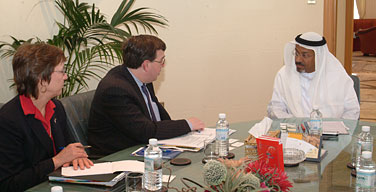|
|
|
||||||||
|
Short Takes: News from the International Trade Administration Commerce Department Takes Trade Remedy Actions on Glycine and Lemon Juice Imports On April 19, 2007, the Commerce Department initiated antidumping investigations on imports of glycine from India, Japan, and South Korea. GEO Specialty Chemicals Inc. of Lafayette, Indiana, is the petitioner for the investigations. Glycine is used in a variety of food, pharmaceutical, and industrial applications. From 2005 to 2006, imports of glycine from India, Japan, and South Korea increased 10.0, 27.5, and 13.3 percent by volume, respectively. In 2006, import values for glycine were estimated at $2.7 million for India, $3.1 million for Japan, and $1.2 million for South Korea. The U.S. International Trade Commission is scheduled to make its preliminary injury determination on or about May 15, 2007. In a separate action, also on April 19, 2007, the department preliminarily determined that exporters and producers from Argentina and Mexico were selling lemon juice in the United States at less than fair value. The preliminary dumping margins for Argentina and Mexico range from 85.64 to 128.50 percent and from 146.10 to 205.37 percent, respectively. As a result of the preliminary determinations, U.S. Customs and Border Protection has suspended liquidation of entries of subject merchandise and is collecting a cash deposit or bond based on the preliminary rates. The Commerce Department is scheduled to issue its final determinations in those investigations by July 3, 2007. For more information about those and other antidumping actions by the Commerce Department, go to the Import Administration’s “Highlights and New Items” Web page. U.S.–India High-Technology Cooperation Group Meets An important step in the continuing dialogue between India and the United States took place in Washington, D.C., this past February when Deputy Secretary of Commerce David A. Sampson hosted the fifth meeting of the U.S.–India High-Technology Cooperation Group (HTCG). The HTCG was established in 2002 to implement President George W. Bush’s commitment to facilitate high-technology trade between India and the United States, while advancing shared non-proliferation objectives. The HTCG has contributed to a substantial increase in trade between India and the United States. HTCG has two subgroups. One group focuses on strategic trade issues, including export controls, and the other concentrates on bilateral trade development. The Commerce Department’s Bureau of Industry and Security leads the subgroup on strategic trade issues, while the International Trade Administration chairs the subgroup on bilateral trade development of high-technology sectors, such as biotechnology, e-commerce, and information technology. The 2007 round of the HTCG was inaugurated by an industry day on February 22, 2007, that was organized and sponsored by the U.S.–India Business Council. Secretary of Commerce Carlos M. Gutierrez presented the keynote address, in which he reiterated President Bush’s commitment to strengthening the U.S.–India relationship and urged India to further open its domestic markets. At the conclusion of the industry day, business representatives at the event presented a series of recommendations to the cochairs of the HTCG, Deputy Secretary Sampson and Indian Foreign Secretary Shivshankar Menon, on ways the Indian and U.S. governments could improve the commercial environment in several high-technology sectors, including strategic trade, biotechnology and life sciences, defense trade, and information technology and electronic commerce. Those recommendations, along with other issues, were subsequently discussed during the government-to-government dialogue that took place on February 23, 2007. The HTCG has become an important medium to raise the profile of bilateral commercial issues affecting U.S. companies doing business in India. Both Indian and U.S. government officials and private-sector participants said the meetings were successful and productive. The next round will most likely take place in India in late 2007. Information on the HTCG is available on the Web. Trade and Investment Ties Focus of Visit to Gulf States The close trade and investment ties between the United States and Kuwait, Saudi Arabia, and the United Arab Emirates (UAE) were the focus of a visit to the three Persian Gulf states by Franklin L. Lavin, under secretary of commerce for international trade, on March 10–14, 2007. (Story continues below.)
In the UAE, Lavin met with government officials and business groups in Dubai and Abu Dhabi. Speaking on March 12 to the American Business Group of Abu Dhabi, Lavin noted that trade between the United States and the UAE grew more than 40 percent in 2006, with bilateral trade at $13.0 billion. That growth reflects “the continued emergence of the UAE as a regional logistics hub … [and] the enormous growth in the UAE economy.” He also addressed a number of challenges that exist in the U.S.–UAE commercial relationship, including the need for the UAE to improve its export control systems, to eliminate the manufacture and sale of counterfeit goods, and to revise laws that restrict foreign ownership of assets in the UAE. In subsequent stops in Kuwait and Saudi Arabia, Lavin expressed many of the same themes. In a speech to the American Kuwaiti Alliance on March 14, he encouraged the government of Kuwait to undertake legislation that would reduce a tax rate of 55 percent that is applied, sometimes retroactively, to foreign companies. He also urged that steps be taken to better protect intellectual property rights. According to Lavin, passing such legislation “will strengthen our relationship and encourage foreign participation in [Kuwait’s] economy.” During his visits to the three Persian Gulf states, Lavin also spoke of the recently launched “Invest in America” initiative and encouraged local businesses to look to the United States for investment opportunities. “The United States is open for business … [and] has proven to be an outstanding, low-risk environment for international investors,” said Lavin.
|
|
